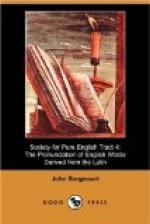STEMS IN -ERO AND -URO. Adjectives of this type keep the Latin stress, which thus falls on the ultima, and shorten or obscure the penultimate vowel, as ‘mature’, ‘obscure’, ‘severe’, ‘sincere’, but of course ‘[=a]ustere’. Of like form though of other origin is ‘secure’. Nouns take an early stress, as ‘[’a]perture’, ‘s[’e]pulture’, ‘l[’i]terature’, ‘t[’e]mperature’, unless two mutes obstruct, as in ‘conj[’e]cture’. Of the disyllables ‘nature’ keeps a long penultima, while ‘figure’ has it short, not because of the Latin quantity, but because of the French.
The lonely word ‘mediocre’ lengthens its first vowel by the ‘alias’ rule and also stresses it. Whether the penultima has more than a secondary stress is a matter of dispute.
STEMS IN -ARI. These words have the stress on the antepenultima, which they shorten, as in ‘secular’ or keep short as in ‘jocular’, ‘familiar’, but of course ‘pec[=u]liar’.
ON CERTAIN GREEK WORDS.
It will have been seen that Greek words are usually treated as Latin. Thus ‘crisis’ lengthens the penultima under the ‘apex’ rule, while ‘critical’ has it short under the general rule of polysyllables. Other examples of lengthening are ‘bathos’, ‘pathos’, while the long quantity is of course kept in ‘colon’ and ‘crasis’. For the ‘alias’ rule we may quote ‘[=a]theist’, ‘cryptog[=a]mia’, ‘h[=o]meopathy’, ‘heterog[=e]neous’, ‘pandem[=o]nium’, while the normal shortenings are found in ‘an[)o]nymous’, ‘eph[)e]meral’, ‘pand[)e]monium’, ‘[)e]r[)e]mite’. Ignorance of English usage has made some editors flounder on a line of Pope’s:
Yes, or we must renounce the Stagirite.
The birthplace of Aristotle was of course Stag[=i]ra or, as it is now fashionable to transcribe it, Stageira, as Pope doubtless knew, but the editors who accuse him of a false quantity in Greek are on the contrary themselves guilty of one in English. The penultima in English is short whether it was long or, as in ‘dynamite’ and ‘malachite’, short in Greek.
There is, however, one distinct class of Greek words in which the Latin rule is not followed. In the sixteenth and seventeenth centuries there were scholars who rightly or wrongly treated the Greek accent as a mark of stress. It is clear that this habit led to an inability to maintain a long quantity in an unstressed syllable. Shakespeare must have learnt his little Greek from a scholar who had this habit, for he writes ‘Andr[’o]n[)i]cus’ and also




